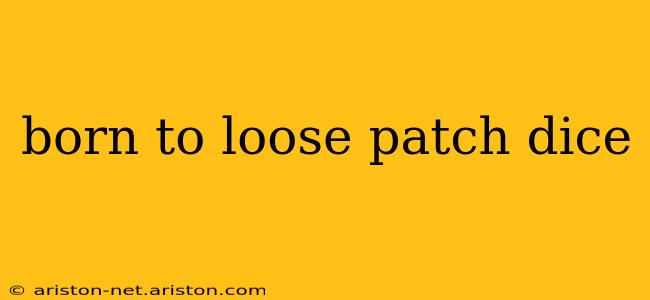Born to Lose, Patch Dice: A Deep Dive into the World of Misfit Toys
The phrase "born to lose, patch dice" evokes a potent image: a rebellious spirit, a sense of being an underdog, and a touch of ironic defiance. While not a widely known idiom in the same vein as "roll the dice," it carries weight, particularly within specific subcultures. Let's explore what this phrase might mean and where it might originate.
The phrase likely stems from a combination of two distinct concepts:
-
"Born to Lose": This phrase itself is quite established. It suggests a predetermined fate of failure, often associated with a feeling of being constantly unlucky or perpetually facing insurmountable odds. It's a self-deprecating acknowledgment of hardship, but can also be interpreted as a form of rebellious nihilism – embracing the inevitable loss rather than striving for unattainable success.
-
"Patch Dice": This is where things get more interesting. "Patch" can refer to something makeshift, repaired, or imperfect. Dice, of course, are tools of chance. Combining these, "patch dice" could symbolize several ideas:
- Improvised gambling: Using homemade, imperfect dice implies a lack of resources or a willingness to gamble with subpar tools, reflecting a desperate or rebellious spirit.
- Unpredictability: Patch dice are inherently less predictable than professionally made dice. This mirrors the unpredictability of life for someone who feels "born to lose," highlighting the chaotic and unpredictable nature of their circumstances.
- Symbolic representation of imperfection: The imperfect nature of patch dice may represent the imperfect nature of the individual who identifies with the phrase – acknowledging flaws and accepting them as part of their identity.
Where might this phrase originate?
Pinpointing the precise origin of "born to lose, patch dice" is challenging. It's likely a colloquialism, perhaps arising within specific communities or subcultures, rather than from a single source like a book or song. It could have evolved organically through word-of-mouth, spreading across different groups over time.
Its appeal lies in its evocative nature – it speaks to a sense of outsider status, a feeling of being different or even cursed by fate. It's a phrase that resonates with those who have a history of setbacks, who have faced adversity and learned to accept their circumstances, or who choose to embrace their perceived disadvantages as a source of strength.
People Also Ask:
What does "born to lose" mean?
"Born to lose" typically signifies a sense of inevitable failure or perpetual bad luck. It’s often used to describe someone who seems destined for misfortune, regardless of their efforts. It can be a self-deprecating statement or a cynical outlook on life.
What does "patch dice" mean?
"Patch dice" refers to dice that are makeshift, repaired, or imperfect. It might refer to dice made from crude materials or poorly crafted, highlighting their lack of precision and reliability compared to professionally manufactured dice.
Is "born to lose, patch dice" a common phrase?
No, "born to lose, patch dice" is not a widely known or established idiom. Its use is likely confined to smaller communities or subcultures where its meaning resonates with the group's experiences and sentiments.
What kind of person would use the phrase "born to lose, patch dice"?
This phrase would likely appeal to individuals who embrace a sense of being an outsider, who feel like underdogs or have a history of setbacks. It might resonate with those who feel a sense of fatalism or who have found a strength in acknowledging their flaws and imperfections.
In conclusion, "born to lose, patch dice" is a fascinating phrase that holds significant meaning, though its precise origin remains uncertain. Its power lies in its evocative imagery and ability to capture a particular mindset and perspective, particularly amongst those who feel they're facing an uphill battle against the odds. The inherent imperfection and unpredictability it represents serve as a powerful metaphor for the complexities of life and the defiant spirit of those who refuse to be defined by their circumstances.
